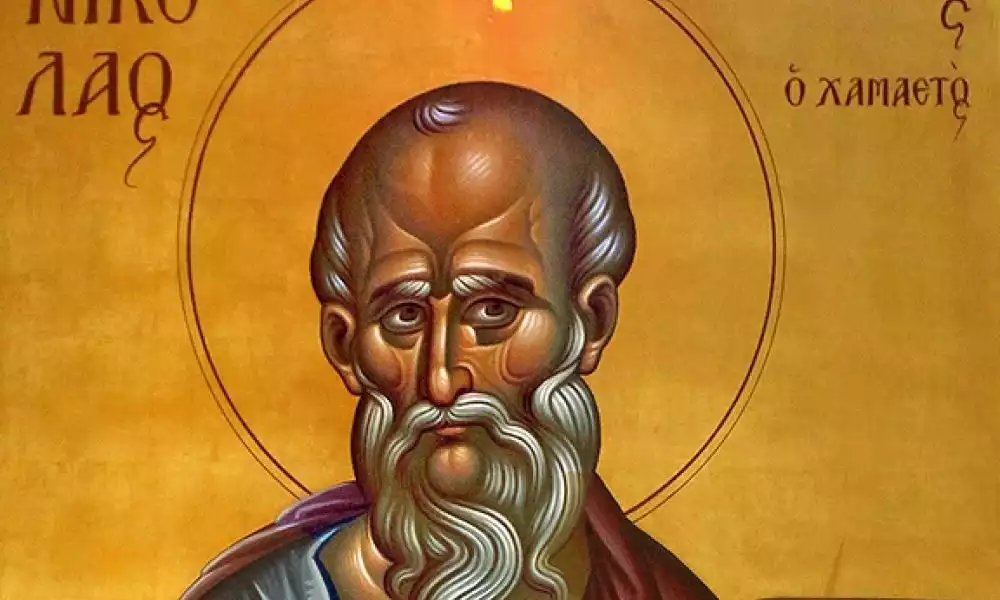
Saint Nikolaos Kabasilas, a towering figure in Eastern Orthodox theology, lived during the 14th century, with his life spanning from approximately 1319 to 1391. Esteemed for his profound spiritual insights and theological contributions, Kabasilas remains a revered saint and intellectual beacon in the Orthodox Church. His works, marked by deep contemplation and theological acumen, continue to resonate in contemporary Orthodox thought.
Early Life and Education
Born in the early 14th century, Nikolaos Kabasilas’ early years were steeped in the rich cultural and intellectual milieu of Byzantium. His formative years, though shrouded in limited historical documentation, were undoubtedly influenced by the prevailing religious and philosophical currents of his time. His education, reflective of the era’s emphasis on classical learning, imbued him with a profound grasp of both secular and religious studies, laying the foundation for his future theological explorations.
Kabasilas’ journey towards becoming a theological luminary commenced in these early years, where his exposure to diverse schools of thought shaped his perspectives. His intellectual growth was further catalyzed by the vibrant academic environment of Byzantium, renowned for its scholarly pursuits and theological discourse. This period of his life was crucial in molding his understanding of Orthodox Christianity, which would later become evident in his writings and teachings.
Theological Contributions and Works
Nikolaos Kabasilas’ theological legacy is primarily anchored in his seminal works, which include “The Life in Christ” and a commentary on the Divine Liturgy. These writings, characterized by their depth and clarity, offer profound insights into the spiritual life and liturgical practices of the Orthodox Church.
The Life in Christ,” Kabasilas’ magnum opus, delves into the mystical dimensions of Christian life. It emphasizes the transformative power of participating in the sacraments, particularly the Eucharist, and underscores the significance of living a life in union with Christ. This work, revered for its theological depth, continues to be a pivotal reference in Orthodox spirituality.
Furthermore, his commentary on the Divine Liturgy provides an intricate understanding of Orthodox liturgical practices. It elucidates the symbolic and spiritual meanings behind the liturgical rites, offering believers a deeper comprehension of their faith’s rituals. Kabasilas’ analysis in this commentary reflects his profound reverence for the Orthodox liturgical tradition and his commitment to elucidating its spiritual essence.
Through these works, Nikolaos Kabasilas has left an indelible mark on Orthodox theology. His writings not only offer a rich tapestry of theological thought but also serve as a spiritual guide for Orthodox believers, aiding them in their quest for a deeper relationship with the divine.
Influence and Legacy
Nikolaos Kabasilas’ influence extends far beyond his lifetime, with his theological ideas deeply impacting Eastern Orthodox Christianity. His contemplative approach to faith and emphasis on personal spiritual experience have made significant contributions to Orthodox spirituality. Kabasilas’ work significantly shaped the Orthodox understanding of theosis, the process of becoming divinized or partaking in the nature of God, which remains a central tenet of Orthodox theology.
His teachings, particularly on the sacramental life, have offered a unique perspective on how believers can attain closeness to God. By advocating a life deeply rooted in the sacraments, Kabasilas helped forge a path for believers seeking a more profound spiritual connection within the framework of Orthodox traditions. His insights into the mystical aspects of faith continue to inspire theologians, clergy, and laypeople alike.
Theological Themes and Philosophical Insights
Kabasilas’ theological discourse is marked by several recurring themes, such as the transformative power of divine grace and the importance of personal commitment to spiritual growth. His writings reflect a deep engagement with the philosophical ideas of his time, blending theological doctrine with practical guidance on living a Christian life.
One of Kabasilas’ notable contributions is his exploration of the relationship between God’s grace and human free will. He articulated a balanced view, acknowledging the necessity of divine grace for salvation while also emphasizing the role of individual effort in spiritual development. This nuanced approach provided a theological framework that resonates with many believers striving to reconcile divine providence with personal responsibility.
Saint Nikolaos Kabasilas’ theological contributions have left an enduring legacy within the Eastern Orthodox Church. His profound understanding of Christian spirituality and commitment to elucidating the faith’s deeper truths have cemented his status as a pivotal figure in Orthodox theology. His works continue to inspire and guide those seeking a deeper understanding of their faith, making his teachings as relevant today as they were in his time.
Feast Day: June 20
References
- Church of Cyprus. “Συνέχεια της εκκλησιαστικής ιστορίας.” Accessed December 24, 2023.
- Holy Metropolis of Kifissia. “Ο Άγιος Νικόλαος Καβάσιλας.” Accessed December 24, 2023.
- Orthodoxia News Agency. “Ο Άγιος Νικόλαος Καβάσιλας.” Accessed December 24, 2023.
- University of Athens. “Άγιος Νικόλαος Καβάσιλας.” Accessed December 24, 2023.
Kabasilas Nikolaos – On Life in Christ. First Discourse (A’)
